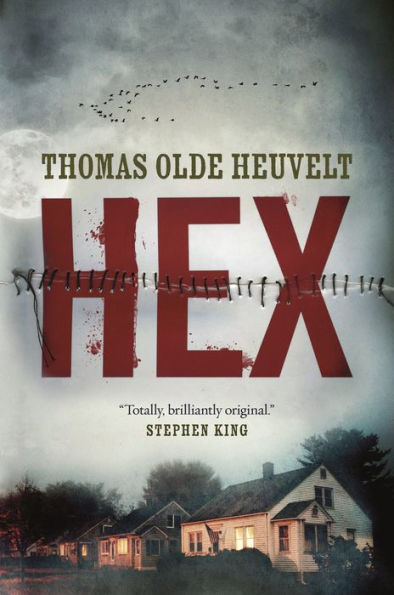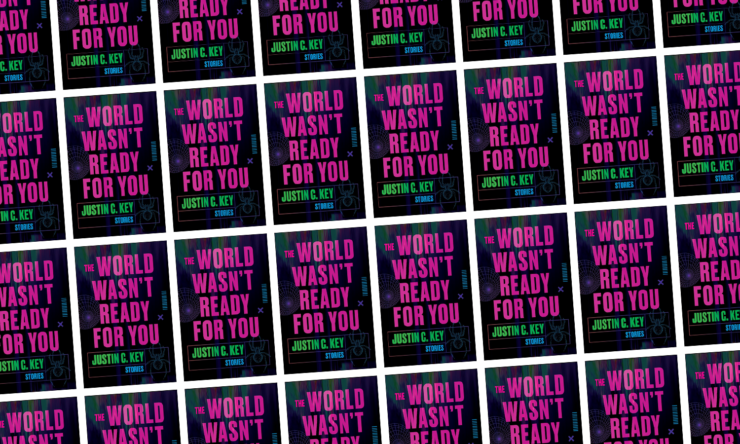Treading neatly between body horror, surveillance-state science fiction, and existential dread, Justin C. Key’s debut short story collection The World Wasn’t Ready For You is an unassuming portal to a much stranger, slyer world. There is nothing neat or cathartic about the way Key pokes and prods at conflict, or when he chooses existential violence and leaves his characters’ lives chaotically unresolved; “Now You See Me” in particular sees Key at the height of his powers as he marries his medical background and experience with an unnerving slow-burn narrative about the Black American experience of being ignored, dehumanized, vilified, and pushed to the limits of survival.
Across nine stories, Key consistently does well at setting a leisurely pace toward madness, avoiding the usual cliches and expectations along the way. The anthology is generally structured around interpersonal or slice-of-life problems that start to take on varying flavors of sinister absurdism. For instance, “Now You See Me” starts off with a recognizable setup—a group of (mostly) well-intended, curious white friends who attend a Black Lives Matter art exhibit; it’s quick and easy to recognize, in Key’s careful group portrait, the tendency of one person to push performativity to uncomfortable heights in the name of allyship, overshadowing the others’ uneasiness with loud bravado and a suspicious lack of self-awareness. Afterwards the protagonist slowly begins to realize that perhaps this wasn’t an exhibit meant for them, a gnawing suspicion that grows and festers as her daily life begins to change.
By Key’s own admittance in his author’s note, some of these stories are simple inverted tropes—he briskly upends the Magic Negro trope in “Afiya’s Song,” a story partly structured around oral history and set on a slave plantation in a version of the antebellum South. “Afiya’s Song” also introduces a common internarrative thread: the shared background fiction of Sanai, a long-gone West African kingdom that was once colonized by Portuguese slavers. The Sanain queen Adesokash, a heroic figure who fought for the lives of her people, makes a recurring appearance as a legendary source of healing through music, and serves as a reminder of several characters’ ancestry and heritage. This Sanain thread creates an undercurrent of cohesion while gently, sporadically nudging the reader toward an overall sense of immersion in Key’s world.
The most obvious throughline of this collection is the body, which Key explores along a spectrum of gentle, tech-mediated nuance to visceral flesh-and-blood brutality. My favorite is “Spider King”, the tale of a man who gets out of jail early in exchange for participating in an experimental anxiety treatment program. Darnell isn’t even guilty of the crime he’s accused of, not that it matters to the world, and he’s eager to return home to his wife and daughter. What ensues is nothing short of a nightmare as his body becomes a seething, fleshy timeshare for arachnids, which threaten to sabotage his precarious reentry into normal life. There’s a lovely dark intimacy in Darnell’s relationship with his unruly tenants that wrapped me into this tight neurotic little bubble, and I easily found it to be one of Key’s more emotionally resonant pieces. This is to say, “Spider King” is simply a great piece of body horror that bristles on the page and in the mind.
Buy the Book


The World Wasn’t Ready for You
Key also shows a gift for dread and more intangible forms of horror in “One Hand in the Coffin”, which made for some grim reading as someone with a kneejerk aversion to dolls. It doesn’t require an advanced degree to understand why the basic juxtaposition of children and horror always makes such a striking impact; to do this well is a whole other thing. Here, Key’s psychiatric training helps to bolster the story of neurodivergent twins Corey and Alisha and the difficult aftermath of their older brother’s death—not just a story of trauma and loss, but a complex knot of love and hate that goes hand-in-hand with abuse and abandonment. That it is the most jarring work in the anthology is a testament to its purpose.
There are moments of relative sanity between the flesh and bone of Key’s strongest work: “Customer Service” is a light epistolary-style series of emails that taps into the very human fear of being body-snatched by technology. It’s a smart moment of levity before the penultimate and final stories, which both hang heavy with real-world parallels. The titular story is a personal, at times messy exploration of fatherhood in a futuristic setting where Earth awkwardly lives alongside a huge alien mothership; the Keplans are an interstellar race of people with mood-changing skin, telepathy, and the ability to communicate with technology. The protagonist is a Black father who struggles to connect with his half-Keplan son in the wake of his wife’s passing. It’s a noticeable departure from the neat linearity and measured cadence of the previous stories, with Key poking and prodding at the emotional turbulence and unpredictablity of parent-child dynamics. And while it didn’t sit in my head with as much focus or clarity as its predecessors in the book—it is arguably the weakest link in the collection—it somehow felt right to close out the anthology with a perspective pointed at the stars, at the unknown.
The World Wasn’t Ready For You is a remarkably polished debut—a strong body of work informed by Key’s psychiatric expertise and thoughtful reflection on contemporary America and the world beyond. Key’s debut is a fine new addition to the pantheon of Black American horror, a subgenre that hasn’t really, really received broad mainstream due despite existing long before Lovecraft Country—based on a novel written by a white man—made it big on HBO. And while I remain particularly fond of the smaller-scope stories, there’s something really exciting about the way Key hints at a bigger picture not just through the Sanain worldbuilding elements but the planetary scope of the final story. Despite its rough edges, “The World Wasn’t Ready For You” reveals the existence of a much larger, richer universe in Key’s mind—a bigger picture that hopefully we might see again in a tighter, more powerful form.
The World Wasn’t Ready for You is published by Harper.
Alexis Ong is a freelance culture journalist with weak ankles who mainly writes about games, tech, and pop culture. Her work has appeared in The Verge, Polygon, Kotaku, Rock Paper Shotgun, VICE, Dazed Digital, and more; soft spots include science fiction, internet archaeology, comics, boxing, and old games. You can find her at her website or on Twitter.










